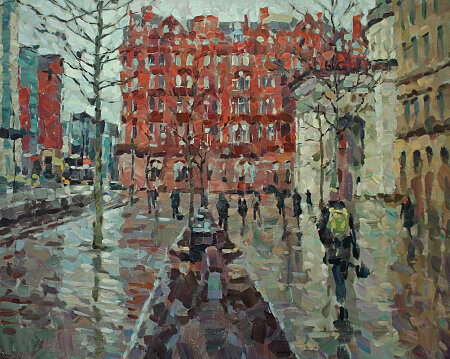
Ann Northcott and the Russian Palace
*
We were now in the kitchen, where locks of Ann’s hair still lay on the counter next to the long scissors, which she’d left wide open. I secretly pinched a tress, slugged a shot of extremely cold vodka, shuddered. Ann giggled, watching me. I realized with satisfaction as the vodka made its thrilling, difficult way down my gullet that she had not ditched me, though it was a big party with plenty of kids, plenty of guys to pair off with or girls to talk to. I looked around apprehensively for Preston. Of course at that moment he strode around a corner into the kitchen, still with the self-conscious look of someone who expected to be recognized and applauded for his letter in the Times. He was, after all, a leader among us kids, with his ability to speak knowledgeably, confidently, without embarrassment, even at large, noisy assemblies at the community center, somehow commanding attention without raising his voice. I sorely wished I could do that. And he was generally a rather nice person, I had to admit; he was concerned about how other kids were faring in the suburban wilderness, as we thought of it. I decided to head him off as he looked penetratingly at Ann.
Been exploring the house—? he started to ask her insinuatingly. I jumped in.
Preston, did you see my piece in the Town Review?
He gave me a sudden look in which I saw a mix of pleasure, interest, and annoyance. He knew what I was doing yet seemed genuinely pleased for me. Ann looked bored.
No, Tom, no, I didn’t. I’ll pick up a copy and read it. Congratulations.
Thanks.
What’s it about?
This and that. A blend of story and poetry. I prefer to let it speak for itself.
Right, right—that’s always best.
He returned his attention to Ann, but just then she took off to talk to Carole and no doubt try to get higher.
For the record, Preston never said a thing to me about my piece in the Town Review.
A sensitivity session had started in the living room, complete with a trust fall, which in the shrieking hilarity was turning into a trust shove. Preston waded into the circle.
No, no, no! You don’t fling each other back and forth like that. It has to be gentle, caring. Sensitivity, remember?
Having schooled us in the trust fall, Preston then led a discussion about vulnerability, about social ostracism, about personal secrets. He actually got some of us to tell some rather dark ones.
Ann Northcott, what about you? Preston said. You’ve been quiet.
I do have a secret, she said.
Go on.
I’ll never tell it. It wouldn’t be a secret then.
*
As the discussion ended, as adulation swirled around Preston, I seized the moment to get to Ann again.
Let’s go to a Russian restaurant in the city, I said.
Now?
Probably not now, but next week. Say, Tuesday night.
Why?
It will be an adventure.
Why Russian?
I don’t know exactly why, but after seeing that painting upstairs with you, hearing what those old people said, I haven’t been able to stop thinking about going to a Russian restaurant. I know there are some in the city, probably several. I’ll look them up and call you.
Okay.
If you’ll give me your number.
Ann gave me a puckish grin, working her pretty lips to one side.
What if it’s boring?
It will be exotic! All sorts of food we’ve never had, décor we’ve never seen, atmosphere. Besides, it won’t be boring when we skip out on the check and have to run for it.
You would do that? Her eyes widened with delight.
No, actually I wouldn’t.
I didn’t think so. I want to go with a guy who would.
Suddenly she seemed deflated, dismal. The high was wearing off.
Ann Northcott gave me her number.
*
My private agitation over the palace painting was not easily fathomed, captured, explained, or given to someone else. In the palace, I felt sure, sat a princess playing a silvery harpsichord as eternal snow buried everything outside. Princess (not shown) and palace lay under grave political danger, the painting appeared to say. Ann Northcott seemed uninterested in any of that—or was she? After all, she’d asked whether the palace was still there. Preston would have been interested, but I never talked to him about it. I should have; it was his meat and drink, suburban malaise and its possible cures, which is to say, how we could transform private kindlings into public action, or into personal fulfillment. But that sounds so dull and sociological.
*
Naturally, I picked the restaurant called the Russian Palace. I remember it took some doing to persuade my parents to let me take a train into the city on a weeknight, even though I was a senior. We must have worked out an agreeable curfew based on the train schedule. Ann was silent for most of the ride in, watching thin sundown light fade in the falling snow, watching houses and apartment buildings flash past, Ann sitting hunched, indifferent, withdrawn, unformed but forming, on remote steppes sparse of village and heavy of wind, far away, and somewhere under a low bush a small bird sang. When we reached the vast underground approach to Grand Central Station, she looked out at distant bare bulbs as the train lurched and wheels screeched on tracks, and she suddenly saw herself in the black window.
